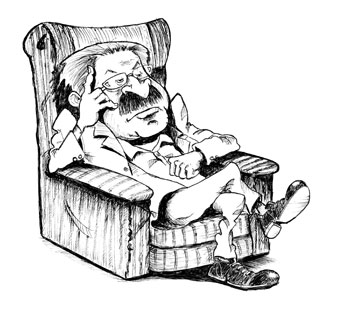If the parties are going to decide everything anyway, what is the point of having a large and expensive Constituent Assembly

DIWAKAR CHHETRI
With just over four months to go for elections, it does appear as though our international partners are more keen on holding it than Nepal’s leaders. Voters, for their part, are thoroughly disinterested and apathetic because they don’t see new elections resolving anything. What’s the point of voting for the same old people who failed to write a constitution the last time, they ask.
This cynicism is understandable, but it won’t lead us anywhere. The only way to break the impasse and give some momentum to the political process is to have a new vote and hope for the best. However, the run-up to elections has been characterised by chronic bickering and a singular lack of preparation by the parties. It is as if they are resigned to the fact that polls won’t happen as scheduled in November. They must also sense the acute disillusionment among voters and are afraid of losing, but are too consumed by greed and ambition to make way for a new generation of leaders with fresh ideas and perspectives.
The parties are also distracted by deep-seated rivalries and divisions within themselves and are in a wait-and-watch mode. The two Maoist parties are in the throes of an intense power struggle at the top between Baburam Bhattarai and Pushpa Kamal Dahal. The animus between them has peaked with Bhattarai’s resignation from his top post, hinting that Dahal should do the same. The Baidya faction threatened to go back to war in Pokhara, offered talks a day later, and then the very next day, in a surprise move, its two top leaders flew off to China. The NC and the UML, meanwhile, have no new ideas of their own and only act in reaction to moves by the UCPN (M).
India’s Minister of External Affairs, Salman Khurshid, air-dashed to Kathmandu and met 35 leaders in nine hours on Tuesday. His message before leaving Delhi, in meetings with officials here, and before departure from Kathmandu underlined just one main message: to strengthen democracy and ensure stability, Nepal needs elections as scheduled.
The leaders who lined up to meet him at Dwarika’s Hotel heard it, but will they listen? Baidya and his deputy, CP Gajurel, will probably get the same message in China where there will also be strong pressure for the Maoist party to reunite before elections.
The Baidya faction has agreed to talks with the Big Four, but there will be some give and take in return for their agreement to take part in the polls. However, we see the bigger hurdle in how the internal dynamics within the UCPN (M) play out in its Plenum next week.
There are larger, over-arching questions of whether it makes sense to have a bloated 601-member CA made up of the same party proxies as before. Why elect 491 or 601 members to an expensive CA when it will be the same four party syndicate that will decide everything anyway? Why not convene a roundtable meeting of the four big forces to iron out most of the contentious issues beforehand?
That way the election can be to an assembly that will adopt what has already been drafted by the previous CA for the new constitution and leave the contentious issues for later. This would avoid the volatility that is sure to accompany elections when the campaigning is going to be dominated by communal polarisations.
If it is stability and progress we want, this may be the least harmful way forward. An election should be a solution, it shouldn’t make things worse.